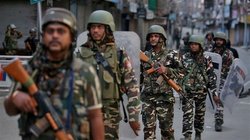 Five United Nations human rights experts have issued an urgent demand to India to lift the communication blackout it has imposed on the disputed Muslim-majority Himalayan region of Kashmir, saying that it amounts to "collective punishment" and worsens the ongoing tensions.
Five United Nations human rights experts have issued an urgent demand to India to lift the communication blackout it has imposed on the disputed Muslim-majority Himalayan region of Kashmir, saying that it amounts to "collective punishment" and worsens the ongoing tensions. RNA - ""The blackout is a form of collective punishment of the people of Jammu and Kashmir, without even a pretext of a precipitating offence," the experts said in a statement on Thursday.
India imposed the near-total blackout after controversially revoking semi-autonomous rule in the part of Kashmir that it controls on August 5. Before making the announcement, the subcontinent engaged in mass mobilization of additional troops to the region, and switched off internet connection as part of the blackout.
The experts added, "The shutdown of the internet and telecommunication networks, without justification from the government, [is] inconsistent with the fundamental norms of necessity and proportionality."
The UN experts said information they had received indicated an increase in arrests of political figures, journalists, human rights activists, protesters and others, noting that they were deeply concerned by reports that security forces have been conducting night raids on private homes, rounding up young people.
"Such detentions could constitute serious human rights violations," the experts said, calling on the authorities to investigate such allegations and to ensure that any confirmed perpetrators are held responsible.
‘Use of live fire’
The experts also voiced concern about the curfew imposed across the region, with "massive numbers of troops [brought in] to enforce restrictions on the freedom of movement and of peaceful assembly, particularly in the Kashmir Valley.”
According to Press TV, the military buildup in the region, they said, has been followed by at least 4,000 detentions and heightened the risk of forced disappearance.
They also noted the "excessive use of force against protesters, including the use of live ammunition."
"India has the responsibility to use the minimum force necessary when policing protests," the experts said, insisting that deadly force could only be used as a "last resort and to protect life."
Kashmir has been split between India and Pakistan since their partition in 1947. Both countries claim all of Kashmir and have fought three wars over the territory.
India regularly accuses Pakistan of arming and training militants and allowing them to cross the restive frontier. Pakistan strongly denies the allegation.
847/940